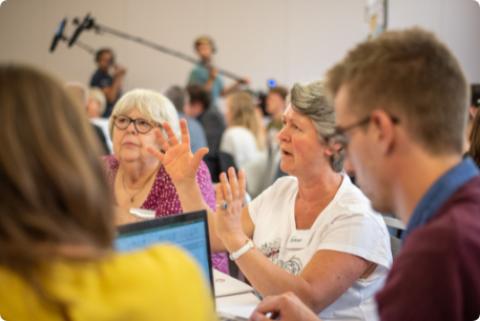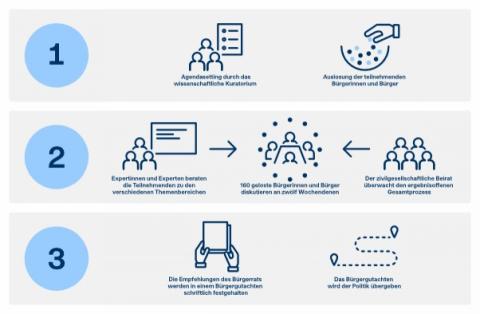From April 26 to June 23, the Climate Assembly met to discuss the question: “How can Germany achieve the goals of the Paris Climate Agreement - considering social, economic and ecological perspectives?” 160 people, randomly selected from all over Germany, spent more than 50 hours discussing the issue, listening to presentations and developing recommendations. Now they present their conclusions - with a clear mandate to policymakers to continue to pursue the 1.5° target in order to "ensure the preservation of the livelihoods of all people." Below is a list of all the guiding principles and recommendations that were developed by the citizens in the various fields of action - each with an indication of the percentage by which the recommendation was adopted by the entire Climate Assembly.
Overarching guiding principles- 1. the 1.5 degree target has top priority.
We are all equal before the climate. To ensure the preservation of the livelihood of all people, on which the future of the coming generations depends, the 1.5 degree target is non-negotiable. Every new law must be checked for its climate protection effect and should not counteract the climate targets. Climate protection is a human right and must be included in the constitution
Adopted with 93%
- 2. Climate protection serves the common good and has priority over individual interests.
In terms of the common good, the protection of the planet has top priority; economic interests and individual interests must be subordinated to this. In particular, large companies must be obliged to act in the interests of climate protection and the common good.
Adopted with 96%
- 3. Transparency & information must be guaranteed for every action that has an impact on the climate.
Every citizen must be able to make his or her own informed decisions. This requires education and transparency about climate impacts and consequences. Therefore, everyone must have access to all relevant information. There is a governmental duty to educate.
Adopted with 97%
- 4. Everyone must take responsibility for climate change and be prepared to make changes.
Change is necessary and should be seen as an opportunity. For the necessary transformation we need an economical, political, social and individual change of consciousness and readiness for something new. Politics and society must be guided by their responsibility for a climate-neutral, fairer and better future.
Adopted with 96%
- 5. Climate protection must be integrated in all educational programmes.
Climate protection education must be made mandatory in all educational institutions and curricula in order to expand climate protection awareness, promote climate-neutral behavior and strengthen the commitment to act.
Adopted with 97%
- 6. The climate transition must be just for all generations.
Our current actions must not disadvantage future generations. Lowering the voting age to 16 gives younger generations more responsibility and increases pressure on politicians to take more responsibility for future generations.
Adopted with 85%
- 7. The climate transition must be socially just.
To shape an inclusive future, sustainable environmentally-friendly ways of living must be accessible to everyone. Contributions to this transition must be made according to the principle that the polluter pays. The burdens of the transition must be shared equally on all shoulders in a way that is socially just.
Adopted with 97%
- 8. The climate transition must be globally just.
Climate protection is a global challenge. Outside Germany, there are many countries that are more severely affected by climate change; humanitarian catastrophes must be averted. Therefore, responsibility must be taken for the countries that are particularly affected by climate change and pressure must be exerted on climate sinners. Climate policy and peace policy go hand in hand.
Adopted with 91%
- 9. The future of the economy must be climate neutral.
Germany should lead the way as a global role model for climate-neutral living and business. The state should use economic policy instruments at its diposal to give a competitive advantage to companies that operate in a climate-neutral and environmentally friendly manner. The promotion of climate-neutral and environmentally friendly technologies and new jobs in the sector are indispensable for this.
Adopted with 95%
- 10. Climate-relevant actions must have a direct impact on those who act.
To achieve climate goals, climate friendliness must be attractive and desirable. Government spending and action must take into account climate impacts. The choice of environmentally friendly alternatives must be encouraged through incentives. Climate-damaging actions must be taxed and sanctioned, and climate crimes must be punished.
Adopted with 96%
Guiding principles for action in the field of energy 1. The state is responsible for setting the framework to guide the energy transition.- It is to act in a non-bureaucratic, cross-party and humanistic manner in the spirit of intergenerational justice.
- The speed of the energy transition has priority over the costs, whereby the consumer should carry the least financial burden.
- Security of supply should remain guaranteed.
- Citizen acceptance must be ensured through increased participation.
Adopted with 95%.
2. 70% of Germany's total energy supply is to be covered by renewable energies by 2035 and 90% by 2040.- In the electricity sector, 100% should be achieved earlier, by 2035.
Adopted with 95%.
Guiding principles for action in the field of mobility From now on, all measures and decisions of the federal, state and local governments in the field of mobility must take into account the goal of far-reaching climate neutrality as a top priority.
In doing so, public space should become an attractive habitat for people, animals and plants. Avoiding traffic that is harmful to the climate is just as important as shifting traffic to attractive, fast and socially acceptable alternatives in cities and rural areas. Whether or not people’s mobility needs are met must not be dependent on their income. Public transport, cycling and walking must have priority over private motorized transport and, in the case of long-distance transport, rail transport must take precedence over air travel.
Adopted with 97%
Guiding principles for action in the field of buildings and heating 1. In order to achieve the 1.5°C target, the federal, state and local governments are called upon to decisively advance the heating transition through accompanying legislation and appropriate financing in the next two legislative periods.
Adopted with 98%
2. At the same time, acceptance of the heating transition should be promoted through broad-based information campaigns and ongoing dialogue between all stakeholders, and the status of the skilled trades in this area should be raised.
Adopted with 97%
Guiding principle for action in the field of nutritionThe transition to climate-friendly agriculture is to take place without delay and ensures the supply of healthy food that is affordable for the entire population as well as an income for the producers.
Adopted with 99%


